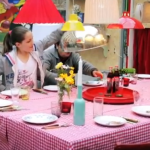By B.L. Ochman
Coca-Cola has been engaging in a “Happiness Campaign” for several years, surprising and delighting consumers aruond the globe by having Coke vending machhines dispense everything from flowers to pizzas, along with enough Coca-Cola for a party.
The Coca-Cola Happiness Campaign is fun, funny, upbeat, and more than a little silly – all elements sorely missed in most brand marketing. The videos of the Happiness Machines go viral because it’s clear that people are having a good time and their responses are genuine and not staged – which makes me wonder why their latest effort is a Facebook app you have to “Like” to see.
The videos of the Happiness Campaign have gone viral, but not, says their agency, because that was the intent of the campaign. “If your strategy is to go viral from the outset, then it’s likely to fail,” Paul McClay,Director of Interactive Strategy for Definition 6, which created the campaign, told Mashable.
What goes viral?
Coke’s Happiness Campaign has these elements that can cause virality:
o Knockout creative that’s funny, shocking, intriguing or surprising
o An idea customers can relate to and care about
o A clear cut message people can pass on with one descriptive sentence
o A concept that builds relationships with customers by getting them to interact with others
Doing Good
 Recently, the Happiness campaign has begun experiments beyond just engaging consumers. They’ve begun testing the happiness concept in philanthropy and a Facebook app which collects emails for promotional mailings from Coke and its affiliates.
Recently, the Happiness campaign has begun experiments beyond just engaging consumers. They’ve begun testing the happiness concept in philanthropy and a Facebook app which collects emails for promotional mailings from Coke and its affiliates.
Last month, Coke began testing a vending machine lets customers make a specified donation to The American Red Cross using a credit or debit card when buying a Coke. A wonderful concept, and one that is sure to spread to social media efforts by other brands.
Forcing Facebook Likes
With all the good Coke’s Happiness Campaign has going, it’s hard to understand their new Facebook approach. In September, to celebrate reaching 50 million Facebook “Likes” Coke introduced a Sharing Happiness Facebook app.
Since you’re forced to “Like” Coke to learn the details, that’s as much as I can tell you about how the app works. Being forced to “Like” a brand simply doesn’t make me happy.
You have to agree to get promotional emails from Coke and its affiliates.
“Your name and email will be stored by The Coca-Cola Company in the United States and will be used to provide you with marketing emails. The United States may have privacy laws that are different from those in the country in which you live. Your information may be disclosed to service providers who handle campaigns on our behalf or to affiliates who may also send you marketing offers and information.”
Um, nope. Nuh Uh! Not me. But, so far, that’s fine with 52 million people, so what do I know?!
If the app is so great, and so much fun, people will not need to be forced to “Like” it. That’s the heavy hand of bean counters and corporate executives who still don’t get the value of social media.
Next step or Mis-step?
Coke calls the app the next step in fan culture. I call it an annoying intrusion. What do you think?
The global marketing campaign kicked off in January 2009, with Cee Lo Green and Janelle Monae appearing in a music video that debuted exclusively on American Idol. The Happiness Campaign is an expansion of The Coke Happiness Factory, developed in 2006 by Weiden+ Kennedy.
Hopefully, Coke won’t let the campaign devolve into yet another crassly commercial brand stunt. Misstep or next step: remains to be seen.








Hey BL,
I like W+K and Coke. They clearly get marketing, branding and consumers. That said, I’m okay with the “happiness factory” campaign but view it as a bit nonendemic. A free Coke machine located where people are truly parched or thirsty is way better than one in a cafetorei at St. John’s University. Happy is good so long as it’s tied to big “refreshment.”
Nice post!
Thanks Steve. The W+K campaign was morphed into the broader Happiness Campaign in 2009. A couple of other agencies have since been involved. Happy is good. IMO, forcing me to “like” happiness blows.
Forced “likes” are also useless because it’s very easy for a Facebook account owner to unlike something immediately after clicking the ‘Like’ button. It’s the one seeming inconsistency in their Happiness ad campaign.
that’s certainly what I do :>)
Bringing likes isn’t difficult now. You can get them through online tools. Unless you have good interaction with the users and have regular visitors the thing will not go on our way.